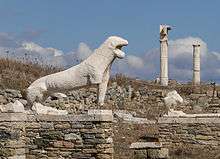λέων
See also: Λέων
Ancient Greek

Λίθινος τῆς Δήλου λέων
Etymology
Many ancient languages possessed similar words for lion, including Akkadian 𒌨 (labbu) (reconstructed to Proto-Semitic *labiʾ-). It is unclear which of them are related and who borrowed from whom. The ultimate source is likely not Indo-European, however.
The τ (t) in the stem λεοντ- (leont-) was influenced by the present participle. The original stem was *λεον- (*leon-), as shown by λέαινα (léaina, “female lion”) and Latin leō. If the stem were originally λεοντ- (leont-), the feminine form would be *λέουσα (*léousa).
Pronunciation
- (5th BCE Attic) IPA(key): /lé.ɔːn/
- (1st CE Egyptian) IPA(key): /ˈlɛ.on/
- (4th CE Koine) IPA(key): /ˈle.on/
- (10th CE Byzantine) IPA(key): /ˈle.on/
- (15th CE Constantinopolitan) IPA(key): /ˈle.on/
Noun
λέων • (léōn) m (genitive λέοντος); third declension
- lion
- 428 BCE – 347 BCE, Plato, The Statesman 291a.9:
- πολλοὶ μὲν γὰρ λέουσι τῶν ἀνδρῶν εἴξασι καὶ Κενταύροις καὶ τοιούτοισιν ἑτέροις
- polloì mèn gàr léousi tôn andrôn eíxasi kaì Kentaúrois kaì toioútoisin hetérois
- πολλοὶ μὲν γὰρ λέουσι τῶν ἀνδρῶν εἴξασι καὶ Κενταύροις καὶ τοιούτοισιν ἑτέροις
- lionheart, savage (one having the characteristics of a lion (positive or negative): savage, noble, or brave)
Usage notes
Alternative forms of the dative plural include λείουσι (leíousi) (late Epic) and λεόντεσσι (leóntessi).
Inflection
| Case / # | Singular | Dual | Plural | ||||||||||
|---|---|---|---|---|---|---|---|---|---|---|---|---|---|
| Nominative | ὁ λέων ho léōn |
τὼ λέοντε tṑ léonte |
οἱ λέοντες hoi léontes | ||||||||||
| Genitive | τοῦ λέοντος toû léontos |
τοῖν λεόντοιν toîn leóntoin |
τῶν λεόντων tôn leóntōn | ||||||||||
| Dative | τῷ λέοντῐ tôi léonti |
τοῖν λεόντοιν toîn leóntoin |
τοῖς λέουσῐ / λέουσῐν toîs léousi(n) | ||||||||||
| Accusative | τὸν λέοντᾰ tòn léonta |
τὼ λέοντε tṑ léonte |
τοὺς λέοντᾰς toùs léontas | ||||||||||
| Vocative | λέον léon |
λέοντε léonte |
λέοντες léontes | ||||||||||
| Notes: |
| ||||||||||||
Derived terms
Further reading
- λέων in Liddell & Scott (1940) A Greek–English Lexicon, Oxford: Clarendon Press
- λέων in Liddell & Scott (1889) An Intermediate Greek–English Lexicon, New York: Harper & Brothers
- λέων in Autenrieth, Georg (1891) A Homeric Dictionary for Schools and Colleges, New York: Harper and Brothers
- λέων in Bailly, Anatole (1935) Le Grand Bailly: Dictionnaire grec-français, Paris: Hachette
- Bauer, Walter et al. (2001) A Greek–English Lexicon of the New Testament and Other Early Christian Literature, Third edition, Chicago: University of Chicago Press
- λέων in Cunliffe, Richard J. (1924) A Lexicon of the Homeric Dialect: Expanded Edition, Norman: University of Oklahoma Press, published 1963
- λέων in Slater, William J. (1969) Lexicon to Pindar, Berlin: Walter de Gruyter
- G3023 in Strong’s Exhaustive Concordance to the Bible, 1979
- Woodhouse, S. C. (1910) English–Greek Dictionary: A Vocabulary of the Attic Language, London: Routledge & Kegan Paul Limited.
- Sihler, Andrew L. (1995) New Comparative Grammar of Greek and Latin, Oxford, New York: Oxford University Press, →ISBN
Greek
Alternative forms
- λέοντας (léontas)
- λιοντάρι (liontári)
This article is issued from
Wiktionary.
The text is licensed under Creative
Commons - Attribution - Sharealike.
Additional terms may apply for the media files.